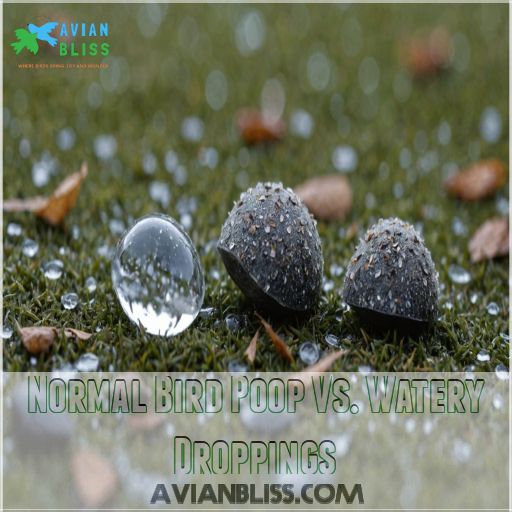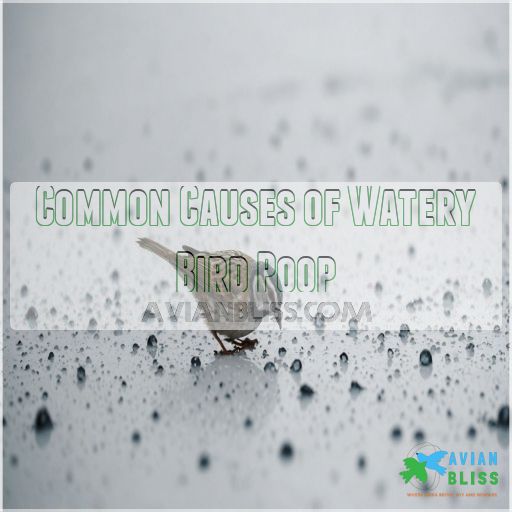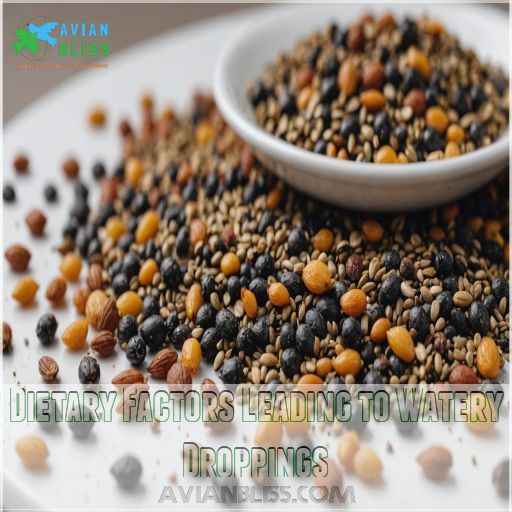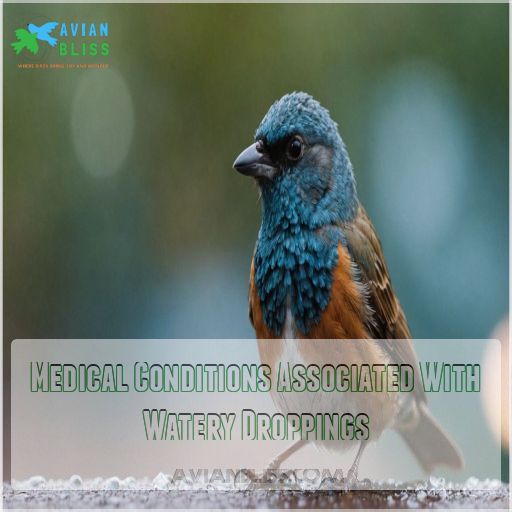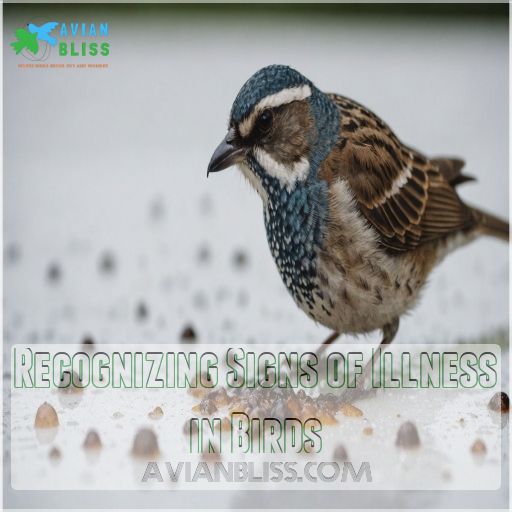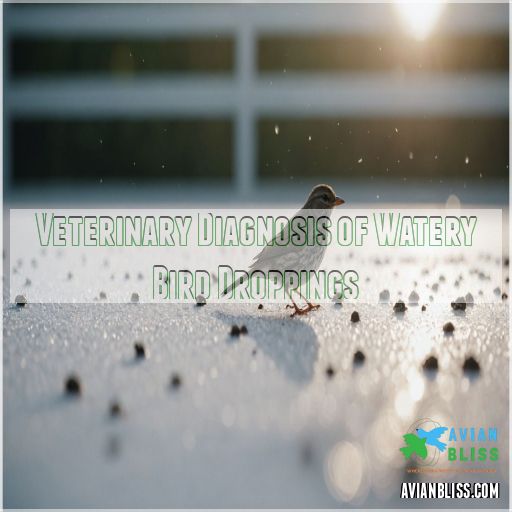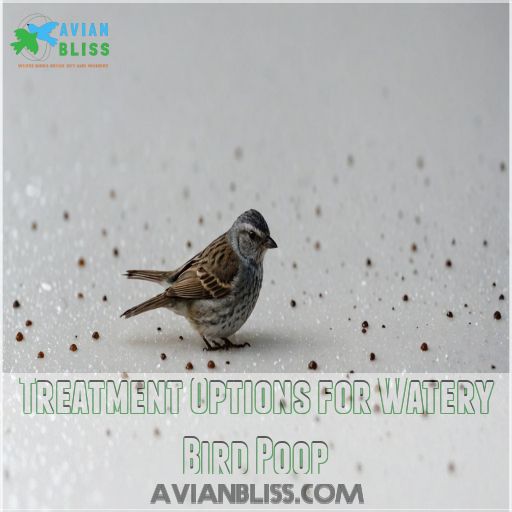This site is supported by our readers. We may earn a commission, at no cost to you, if you purchase through links.
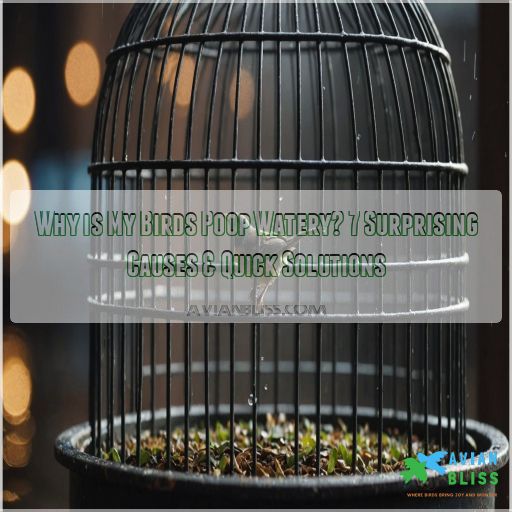
Imagine your bird feasting like it’s Thanksgiving every day—too much fruit or veggies can lead to watery droppings. Excessive water intake or greens could also be the culprits.
Meanwhile, stress or infections might make your feathered friend feel less than chirpy, affecting their droppings. Don’t forget polyuria—an increase in urine—as a possibility, too.
If this persists, it’s time to check in with a vet for a proper diagnosis. Curious about solutions? There’s more to uncover about keeping your bird happy and healthy!
Table Of Contents
- Key Takeaways
- Normal Bird Poop Vs. Watery Droppings
- Common Causes of Watery Bird Poop
- Dietary Factors Leading to Watery Droppings
- Stress-Induced Watery Droppings in Birds
- Infections Causing Watery Bird Poop
- Medical Conditions Associated With Watery Droppings
- Recognizing Signs of Illness in Birds
- Immediate Actions for Birds With Watery Poop
- Veterinary Diagnosis of Watery Bird Droppings
- Treatment Options for Watery Bird Poop
- Frequently Asked Questions (FAQs)
- Why do birds poop watery?
- What are the causes of watery stool?
- Why is my bird poop abnormal?
- Why do birds have Watery droppings?
- Why does my bird poop smell like water?
- How to treat watery bird poop?
- Is it normal for my bird to have watery poop?
- How do you treat diarrhea in birds?
- Why is there a lot of liquid in my bird’s poop?
- What does my birds poop look like when it’s sick?
- Can bird poop transmit diseases to humans?
- Are bird droppings harmful to garden plants?
- How do bird baths affect poop consistency?
- Does diet change help firm bird droppings?
- Are environmental toxins a concern for bird droppings?
- Conclusion
Key Takeaways
- Keep an eye on your bird’s diet – too much fruit or vegetables can make their droppings watery, as if they’re sipping a fruit smoothie instead of eating a balanced meal.
- Bird poop comes with mystery – stress or infections can cause loose droppings. If you notice changes, it might be time for a vet visit and some detective work.
- Differentiate the droppings: polyuria adds clear liquid without changing the feces, while diarrhea alters the fecal consistency. Spotting the difference can save you a trip to the avian expert.
- Birds get stressed like humans do – a new cage mate or room changes can ruffle feathers and affect droppings alike. Create a calm environment to keep their bowels (and nerves) nice and steady.
Normal Bird Poop Vs. Watery Droppings
If you’ve noticed a change in your bird’s droppings, you’re not alone—many bird owners worry about watery poop.
Understanding the difference between normal and watery droppings is important for your feathered friend’s health, so let’s explore what’s typical and what might be cause for concern.
Components of Healthy Bird Droppings
Your feathered friend’s droppings are a window into their health. Normal bird poop consists of three key components: feces, urates, and urine.
The fecal matter, typically green or brown, forms the solid part. White urates, the bird’s version of solid urine, accompany it. Finally, there’s a clear liquid urine component.
Understanding these elements helps you spot when something’s amiss with your birdie’s bathroom habits. By monitoring your bird’s poop, you can identify potential health issues before they become severe, serving as a vital health indicator.
Appearance of Watery Bird Poop
The telltale signs of watery bird poop can leave you scratching your head.
Normal droppings have three components: feces, urates, and urine.
When things go south, you’ll notice changes in color, texture, or consistency.
Watery droppings might look "bubbly" or have large volumes of clear liquid.
Keep an eye out for changes in frequency too – it’s like your bird’s built-in health meter!
Distinguishing Polyuria From Diarrhea
Distinguishing between polyuria and diarrhea in birds can be tricky, but it’s key to proper care. While both conditions result in watery droppings, they’re quite different. Polyuria refers to an increase in urine output, while diarrhea is a change in fecal consistency.
To spot the difference, look for:
- Increased clear liquid in polyuria
- Changes in fecal color or texture for diarrhea
Characteristics of each condition can also be observed:
- White urate component remaining normal in polyuria
- "Pea soup" consistency in true diarrhea
In severe cases, additional symptoms may be present:
- Presence of blood
Frequency and Consistency Changes
Paying attention to your feathered friend’s dropping frequency and consistency is like being a poop detective. It’s not just about how often they go, but also what it looks like when they do.
Let’s break down the clues:
Frequency Consistency What it Might Mean
Common Causes of Watery Bird Poop
If your feathered friend’s poop seems a bit on the watery side, don’t panic.
There could be several surprising culprits behind this issue.
From dietary changes to underlying health conditions, we’ll explore the common causes of watery bird poop and share quick solutions to get your bird back on track.
Common Causes
When bird poop looks like it’s seen better days, there might be a few culprits behind the watery mess.
Diet changes, like too many fruits, can pull a fast one on your feathered friend’s system.
Then there’s stress, and infections, and medical issues playing havoc.
Keep an eye on their habits, as understanding leads to better care!
Recognizing Watery Droppings
Noticing changes in your bird’s droppings can feel like solving a mystery.
Keep an eye out for shifts in dropping color, consistency changes, or abnormal urate color.
Frequency changes, blood presence, or unusual textures signal abnormal droppings.
Understanding these signs gives you bird poop knowledge to help your feathered friend stay healthy.
Treatment And Prevention
Tackling watery bird poop often starts with simple home remedies and stress reduction techniques. Adjust your bird’s diet by cutting back on juicy foods, and consider adding probiotics to help digestion, as unbalanced gut bacteria can lead to issues like diarrhea and dehydration.
Some viral infections, such as Avian Influenza Virus, can also cause watery bird poop, so it’s essential to monitor your bird’s health closely.
Monitor stress levels; birds thrive in stable environments. If problems persist or you notice signs of infection, consult a vet for specific advice.
Dietary Factors Leading to Watery Droppings
If your bird’s poop looks more like a water balloon than a poop pile, it might be from its curious love for fruits and greens.
Too much of a good thing—like watery foods—can turn your bird’s droppings into a hydration fest!
Increased Fruit and Vegetable Consumption
Boosting your bird’s fruit and veggie intake can create a splash—literally! Bird poop might look more watery. It’s not diarrhea, just the body’s natural reaction to these juicy delights.
- Moderate fruit portions.
- Balance with pellets and seeds.
- Monitor poop changes.
- Consult a vet if concerned.
Keep your feathered friend thriving!
Excessive Water Intake
Sometimes, birds act like they’re sipping from a tropical smoothie bar, drinking lots of water.
While hydration is important, too much can lead to watery droppings. Make sure your bird’s water bowl is clean and filled with fresh water.
Different water bowl types impact access and spillage, affecting water quality and bird behavior.
Keeping this balance is key!
Food Allergies and Intolerances
If your bird’s poop is watery, it could be due to a food allergy or intolerance.
Common culprits include chicken, eggs, and certain fruits and vegetables.
Watch for symptoms like digestive issues or skin irritation after feeding changes.
Consult your vet to identify the trigger and find a safe, hypoallergenic diet for your feathered friend.
Nutritional Deficiencies
Now, onto nutritional deficiencies. Imagine your bird as a tiny, feathered symphony that needs the right notes to stay melodious.
Vitamin deficiencies or mineral imbalances can throw it off-tune, showing up as watery bird poop behaviors.
Make sure you provide a balanced diet and consider supplement needs to strike the right chord again, keeping bird poop patterns in harmony.
Stress-Induced Watery Droppings in Birds
Ever notice how a change in your bird’s surroundings can lead to watery poop?
Birds can be surprisingly sensitive to stress from new housemates or even moving their cage.
It’s like their way of saying, "This is too much to handle!
Environmental Stressors
Your bird’s watery droppings could be telling you it’s stressed out. Just like a kid stuck in a new school, birds get jittery too.
Think about factors like cage size, noise levels, and temperature changes. Improving these can ease stress and firm up those droppings:
- ● Good cage space
- ● Manage noise exposure
- ● Stable temperature environment
Changes in Routine or Habitat
When your bird’s routine changes, whether it’s new toys, travel stress, or nest changes, you might notice watery poop—a surefire sign of stress.
It’s like when you’re thrown off by sudden noise levels or altered bird poop amounts.
Keep cage cleaning consistent to help your feathered friend regain a sense of control and stability .
Social Factors and Interactions
Ever notice your bird’s droppings look like they’ve got extra waterworks? Stress from social interactions can turn bird poop into unexpected insights.
Changes like:
- Flock size adjustments
- New cage mates introduction
- Shifts in social hierarchy
- Bullying among birds
can all cause stress-induced watery droppings.
Keep an eye on their bird poop opinions, and you might just solve a mystery! (Source)
Infections Causing Watery Bird Poop
If your bird’s poop looks more like soup than solid, it might be battling a tiny invader.
Infections from bacteria, viruses, parasites, or even fungi can disrupt their gut, and leave you wondering why your feathered friend is producing puddles instead of pellets.
Bacterial Infections
Bacterial infections are a common culprit behind watery bird poop. Conditions like psittacosis, caused by the Chlamydia psittaci bacteria, can lead to symptoms like fever, cough, and diarrhea . Proper hygiene, avoiding contact with infected birds, and prompt veterinary care are key to managing bacterial infections and restoring your feathered friend’s digestive health.
| Bacterial Infection | Symptoms | Transmission |
|---|---|---|
| Psittacosis | Fever, cough, muscle pain | Breathing in contaminated dust or direct contact with infected birds |
| Salmonellosis | Diarrhea, fever, abdominal cramps | Consuming contaminated food or water |
| Avian Chlamydiosis | Respiratory distress, diarrhea | Inhalation of infected bird droppings or feather dust |
Viral Infections
Viral infections can turn a bird’s droppings into an unpleasant soup. Key culprits like:
- Avian nephritis virus
- Chicken astrovirus
- Pigeon paramyxovirus type 1
- Rotavirus A
can cause diarrhea in birds, leaving you scratching your head.
To keep your feathered friend healthy and avoid such ‘bird poop tricks,’ consider the following:
- Quick vet visits
- Nutritious diets
- Clean habitats
- Consistent routines
Parasitic Infestations
Spotting abnormal droppings can feel like a detective story—parasitic infestations make bird poop watery. Common parasites often hitch a ride with our feathered friends, causing digestive woes. Think parasites are freeloaders? Treat and prevent like a pro!
| Concern | Emotion | Action |
|---|---|---|
| Parasitic Identification | Curiosity | Observe closely |
| Treatment Options | Hope | Consult a vet |
| Bird Health Risks | Worry | Act promptly |
Bird health risks demand swift action for fluffy companionship!
Fungal Infections
With a keen eye for detail, you may notice watery bird poop indicating possible fungal infections.
These often emerge from dust infused with bird droppings, common in some species.
Symptoms might seem subtle, but they can include changes in energy or appetite.
Treatment options involve antifungals and diligent cleaning.
Prevention tips include keeping their environment clean and well-ventilated, this can aid in prevention .
Medical Conditions Associated With Watery Droppings
If your bird’s poop looks watery, it could be more than just a messy surprise.
Medical conditions like liver or kidney issues might be to blame.
Don’t worry; understanding these problems helps you take action and keep Polly from feeling poorly.
Liver Diseases
Liver diseases can make your bird’s poop watery, often turning their droppings lime-green or yellow-green (Source).
Be on the lookout for:
- Weight loss and lethargy
- Yellowish skin or eyes
- Increased thirst
- Changes in poop rates and intensities
- Bird poop durations that seem too lengthy
Quick solutions: adjust diet and seek a vet’s help for diagnosis and treatment.
Kidney Disorders
You’re not alone if you’re puzzled by your bird’s watery droppings—it could be a sign of kidney disorders.
From kidney disease symptoms to potential stones, these issues can alter hydration and dietary impacts, making kidney stone prevention essential.
Consider bird poop trends and programs for insights.
Ensuring a balanced diet and proper hydration helps regulate bird poop guidelines effectively.
Pancreatic Issues
Hmm, watery bird poop could signal pancreatic issues.
The pancreas plays a key role in digestion, producing enzymes that break down food.
If it’s not functioning properly, you may notice changes in your feathered friend’s droppings, like increased liquid or undigested food. Keep an eye out and consult your vet if you spot any concerning changes, such as changes in your feathered friend’s droppings, .
Gastrointestinal Tract Problems
Your bird’s watery poop could be a sign of gastrointestinal tract problems, which impact bird gut health.
Digestive issues may arise from imbalances in gut bacteria or gastrointestinal infections, leaving you in a sticky situation.
Probiotics for birds can help restore gut bacteria balance, tackling that problematic bird poop smell. Address these bird poop ethics before things go awry.
Recognizing Signs of Illness in Birds
Recognizing signs of illness in your bird can feel a bit like detective work, but don’t worry—you’re perfectly qualified to be their personal health inspector.
Keep an eye out for behavioral changes, physical symptoms, and shifts in appetite, as these are your bird’s way of saying, "Hey, something might be up!
Behavioral Changes
Birds can be quite mysterious when they’re feeling under the weather.
You might notice lethargy or changes in preening habits.
Watch for vocalization shifts or appetite loss as red flags.
If your feathered friend is sitting low in its cage or ignoring interaction, it’s time to review the bird poop laws—protocols, really—and consult your avian vet.
Physical Symptoms
Spotting physical symptoms in your bird can be like reading tea leaves.
Notice signs such as lethargy, feather plucking, or unusual discharge. Breathing issues or swollen feet can also indicate problems beyond just the bird poop projects at hand.
If these symptoms persist, it might be time to launch a full-scale bird poop initiative by seeking veterinary advice.
Changes in Appetite and Thirst
Ever wonder why your bird’s poop looks more like water than waste? Well, alongside this watery spectacle, appetite loss or a thirst increase can signal trouble.
If your feathered friend suddenly starts refusing food or drinks excessively, these bird poop philosophies might be revealing underlying health issues.
Keeping an eye on weight changes can also provide important insights into their well-being.
Immediate Actions for Birds With Watery Poop
When your bird’s droppings suddenly become watery, it’s like your feathery friend has switched to running a bath instead of making a clean deposit.
Don’t worry; you can be the Dr. Watson to their Sherlock by monitoring changes, adjusting their diet and hydration, and creating a calm environment.
Monitoring Dropping Characteristics
A watchful eye can be your feathered friend’s best defense.
To monitor your bird’s droppings effectively, pay attention to their color, frequency, texture, volume, and odor. Keep a log of these characteristics, noting any sudden changes.
You’ll become a poop detective in no time! Remember, normal droppings have three components: feces, urates, and urine.
By familiarizing yourself with your bird’s usual output, you’ll quickly spot any concerning deviations, making you a skilled observer of your bird’s normal droppings.
Adjusting Diet and Hydration
Check out these dietary adjustments to help your bird’s watery droppings. You’ll want to:
- Reduce fruit intake, as excess can lead to loose stools
- Monitor water consumption to prevent overhydration
- Introduce plain yogurt as a digestive aid
Remember, birds are creatures of habit, so any changes in their diet or hydration routine should be gradual.
Keep an eye out for food allergies or intolerances, which might be sneaky culprits behind those runny droppings.
Providing a Stress-free Environment
After tweaking your bird’s diet, it’s time to tackle stress. Create a bird-safe haven by minimizing loud noises and sudden movements.
Enrich their cage with toys and perches to keep them entertained. Give your feathered friend some quiet time, but don’t forget socialization – they’re social creatures!
Stick to a routine, as sudden changes can ruffle their feathers. Remember, a calm bird is a healthy bird.
Veterinary Diagnosis of Watery Bird Droppings
If your bird’s poop has turned watery, a trip to the vet might be in order.
Your avian doctor will use a combination of physical exams, diagnostic tests, and poop analysis to get to the bottom of your feathered friend’s tummy troubles.
Physical Examination
Scrutiny is key when your vet examines your feathered friend’s watery droppings. During the physical exam, they’ll assess your bird’s overall health and look for clues about the cause.
You’ll see them:
- Observe your bird’s behavior and alertness
- Listen to respiratory sounds
- Check body condition and weight
- Examine feather plumage and skin
This hands-on approach helps your vet piece together the puzzle is key format determin error is.
]]]assistantassistant]]]].gov]assistantassistant]
]]]]assistantassistantassistant]
]]
assistant, they’ll assess your bird’s overall health and look for clues about the cause. You’ll see them: 1. Observe your bird’s behavior and alertness 2. Listen to respiratory sounds 3. Check body condition and weight 4. Examine feather plumage and skin This hands-on approach helps your vet piece together the puzzle of your bird’s health, setting the stage for any necessary follow-up tests.
Diagnostic Tests and Procedures
During your vet visit, expect a range of diagnostic tests to pinpoint the cause of your bird’s watery droppings. These procedures help rule out various conditions and guide treatment.
| Test Type | Purpose | What to Expect |
|---|---|---|
| Bloodwork | Check organ function | Quick blood draw |
| Radiographs | Examine internal organs | Brief X-ray session |
| Specific disease testing | Identify infections | Targeted samples |
Remember, these tests are your feathered friend’s ticket to feeling fly again!
Fecal Analysis and Culture
Fecal analysis and culture are two key tools in your vet’s diagnostic arsenal.
They’ll collect a fresh sample of your bird’s droppings to examine under a microscope and grow in a lab.
This process can reveal hidden culprits like bacteria, parasites, or fungi that might be causing those watery droppings.
It’s like CSI for bird poop – uncovering the microscopic mysteries behind your feathered friend’s tummy troubles!
Treatment Options for Watery Bird Poop
If you’ve noticed your feathered friend’s droppings are a bit too runny, don’t panic. There are several effective treatment options available:
Medication and dietary tweaks
Environmental adjustments
Through these methods, we’ll explore how to get your bird’s poop back to its normal, healthy state.
Medication and Antibiotics
When your feathered friend’s droppings turn watery, medication might be the answer. Antibiotics like bacitracin, neomycin, and tetracycline can tackle bacterial infections causing digestive issues .
However, it’s really important to use bird-specific antibiotics prescribed by a vet to avoid antibiotic resistance.
Remember, while these meds can work wonders, they’re not without side effects. Always follow dosage instructions carefully – your bird’s health depends on it!
Dietary Modifications and Supplements
Your bird’s diet may need some tweaks to firm up those watery droppings. Try adding probiotics to their food – they can help support healthy digestion.
You may also want to experiment with eliminating potential food sensitivities and ensuring their diet is nutritionally balanced.
Making gradual dietary changes can go a long way in resolving this issue, with a focus on gradual dietary changes.
Supportive Care and Environmental Adjustments
Let’s shift from dietary tweaks to supportive care.
Create a cozy haven by choosing a quiet space for your bird.
Maintain cage hygiene, ensuring warmth and humidity are spot-on.
Opt for the right perch size—more Goldilocks than cramped airplane seat!
Remember, a stress-free environment, or stress-free is not present, however stress is implied as stress is mentioned as something to be avoided, so stress is bolded, helps your feathered friend bounce back, chirpy and healthy.
Frequently Asked Questions (FAQs)
Why do birds poop watery?
Watery bird poop can stem from dietary changes, infections, or stress.
Fruits add extra water, while illnesses like bacterial infections or liver problems can also cause it.
If symptoms persist over 24 hours or are accompanied by other concerning symptoms, seek veterinary attention immediately.
What are the causes of watery stool?
Birds’ watery stools may stem from stress, excess water or protein intake, infections, or kidney issues.
Like a detective, observe changes in diet or environment, and if persistent, consult a vet for peace of mind.
Why is my bird poop abnormal?
Your bird’s poop might be abnormal if there’s a sudden change in color, texture, or frequency.
Causes range from dietary changes and stress to infections or liver issues.
If it persists, consult a vet pronto.
Why do birds have Watery droppings?
You might find your bird’s droppings watery due to dietary changes, infections, or stress.
Sometimes it’s just due to eating a lot of fruits.
If it persists beyond a day, consult a vet for advice.
Why does my bird poop smell like water?
Think of your bird’s poop like a traffic signal—changes might indicate a problem.
Watery, smelly droppings often signal a bacterial or yeast infection.
If it persists, visiting a vet familiar with birds is wise.
How to treat watery bird poop?
When your bird’s droppings are watery, it might be a sign of polyuria from a diet change or stress.
Try reducing fruits, monitor their environment, and consult a vet if it persists past 24 hours.
Is it normal for my bird to have watery poop?
Watery bird poop isn’t always normal.
If your bird’s droppings have a higher liquid content but the fecal part remains solid, it might be due to diet changes, stress, or illness.
Consult a vet if it persists.
How do you treat diarrhea in birds?
First, consult a vet to confirm it’s true diarrhea, not polyuria.
Then, adjust your bird’s diet by providing balanced nutrition and limiting high-water content fruits.
Maintain clean living conditions to prevent infections (Source).
Why is there a lot of liquid in my bird’s poop?
Your bird’s poop might look watery due to increased liquid urine, often mistaken for diarrhea.
Causes include dietary changes, infections, or stress.
If it persists over 24 hours, contact a vet for a check-up.
What does my birds poop look like when it’s sick?
Suppose your feathered friend’s poop looks like a watery mess – that could signal an underlying health issue.
Keep an eye out for changes in color, texture, or odor, and consult your avian vet if you notice anything concerning.
Can bird poop transmit diseases to humans?
Bird poop can indeed make you sick, as it carries over 60 diseases, including histoplasmosis, psittacosis, and cryptococcosis.
These infections often spread through inhalation of particles, potentially causing respiratory issues and other health problems.
Are bird droppings harmful to garden plants?
Are bird droppings harmful to garden plants?
When managed correctly, bird droppings can actually be beneficial, providing nitrogen-rich fertilizer that can promote plant growth and health.
They can also carry pathogens that may harm plants.
How do bird baths affect poop consistency?
Installing a bird bath provides clean water, which can hydrate your feathered friends and potentially influence their poop consistency. Adequate hydration generally results in healthier digestion, possibly reducing issues like watery droppings.
Does diet change help firm bird droppings?
Swapping birdseed for more veggies or reducing juicy fruits might just firm those droppings right up.
Droppings color and texture can reflect diet changes.
Monitor for improvement, and consult a vet if issues persist.
Are environmental toxins a concern for bird droppings?
You mightn’t think so, but environmental toxins can impact bird droppings.
Harmful substances like cyanotoxins in contaminated water could be absorbed by birds, affecting their health and potentially the bacteria present in their droppings.
Conclusion
Ultimately, keeping a close eye on your feathered friend’s poop is the name of the game.
Whether it’s a dietary change, stress, or something more serious, don’t hesitate to consult an avian vet if that watery bird poop persists.
With the right steps, you can get your beloved bird back on track to happy, healthy droppings in no time.

